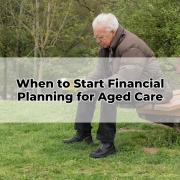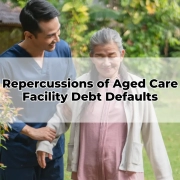Financial Advice for Transitioning from Home to Aged Care
Table of Contents
ToggleMoving from independent living to an aged care facility is a significant life event that requires careful financial planning. The process involves evaluating care needs, understanding associated costs, and ensuring financial structures are in place to support the transition. Families must navigate a range of considerations, including eligibility for government support, the impact on existing assets, and potential tax implications. Thorough planning can alleviate financial stress and provide peace of mind for both the individual and their loved ones.
Assessing Aged Care Costs and Fees
Aged care costs in Australia are determined by several factors, including the level of care required, the chosen facility, and personal financial circumstances. The primary costs include the basic daily fee, which covers daily living expenses, the means-tested care fee, which depends on an individual’s financial capacity, accommodation payments, and additional service fees for extra amenities. Understanding these fees in advance allows families to budget effectively and avoid unexpected financial burdens.
Government Support and Subsidies
The Australian Government subsidises aged care services through My Aged Care, providing financial relief to those who qualify. Subsidies are allocated based on an income and assets assessment, determining eligibility for support programs such as the Commonwealth Home Support Programme (CHSP) or Residential Aged Care funding. Being well-informed about available subsidies can significantly reduce out-of-pocket expenses and ensure individuals receive the necessary care without unnecessary financial strain.
The Role of the Means and Assets Test
The means and assets test is a crucial determinant in calculating aged care costs. This assessment evaluates an individual’s income, superannuation, property, and other assets to determine their financial contribution towards care fees. Effective financial structuring can help minimise costs while ensuring eligibility for government support. Seeking expert financial advice can provide strategies to optimise asset positioning and achieve cost efficiency in aged care planning.
Selling the Family Home: Financial and Emotional Considerations
Selling the family home is often a consideration when transitioning to aged care, as it can provide liquidity to cover fees. However, it also carries emotional and financial implications. The home holds sentimental value, and the decision to sell can be difficult for both the individual and their family. Additionally, proceeds from the sale can impact pension entitlements and tax obligations. Weighing the financial benefits against the emotional costs is essential when making this decision.
Retaining and Renting the Family Home
For some individuals, retaining the family home and renting it out presents a viable alternative to selling. Rental income can help cover aged care costs while allowing the asset to appreciate over time. However, rental income is factored into the means and assets test, potentially affecting aged care fees and pension eligibility. Understanding the financial ramifications of this choice is crucial for long-term planning.
Structuring Investments to Support Aged Care Costs
Strategic investment structuring is essential to sustain aged care expenses. Diversifying assets, ensuring liquidity, and leveraging tax-effective investment options can provide ongoing financial support. An optimally structured portfolio can balance risk and return while preserving capital for future needs. Seeking financial advice ensures assets are aligned with aged care funding requirements and optimised for maximum benefit.
Pension and Superannuation Considerations
Superannuation and pension entitlements play a critical role in financing aged care. The structuring of income streams, account-based pensions, and lump-sum withdrawals can impact aged care fees and tax obligations. Understanding how different superannuation strategies interact with the means and assets test can help individuals maximise their financial resources while maintaining affordability in aged care.
The Importance of Estate Planning
A transition to aged care often necessitates a review of estate planning documents. Ensuring that wills, enduring powers of attorney, and advance care directives are up to date is essential for safeguarding personal and financial interests. A comprehensive estate plan minimises potential disputes, ensures financial affairs are managed in accordance with the individual’s wishes, and protects family wealth for future generations.
Gifting and Financial Implications
Gifting assets to family members can be a strategic move, but it requires careful consideration due to its financial implications. The Australian Government applies gifting rules that impact pension eligibility and aged care fees. Exceeding allowable gifting limits can reduce government benefits and increase overall costs. Consulting a financial adviser before making substantial financial gifts ensures compliance with regulations and prevents unintended financial consequences.
Tax Considerations in Aged Care
Taxation plays a significant role in aged care financial planning. Capital gains tax on property sales, income tax from rental properties, and the tax treatment of superannuation withdrawals all influence overall affordability. Strategic tax planning helps minimise liabilities while maximising available resources for aged care expenses. Aged care-specific financial strategies can optimise tax efficiency and ensure financial stability.
Seeking Professional Financial Advice
Navigating the financial complexities of transitioning to aged care requires specialised expertise. A financial adviser with experience in aged care planning can develop tailored strategies that optimise government support, structure assets efficiently, and ensure long-term financial security. Proactive planning can make a significant difference in managing costs, preserving wealth, and providing peace of mind for families during this important transition.









